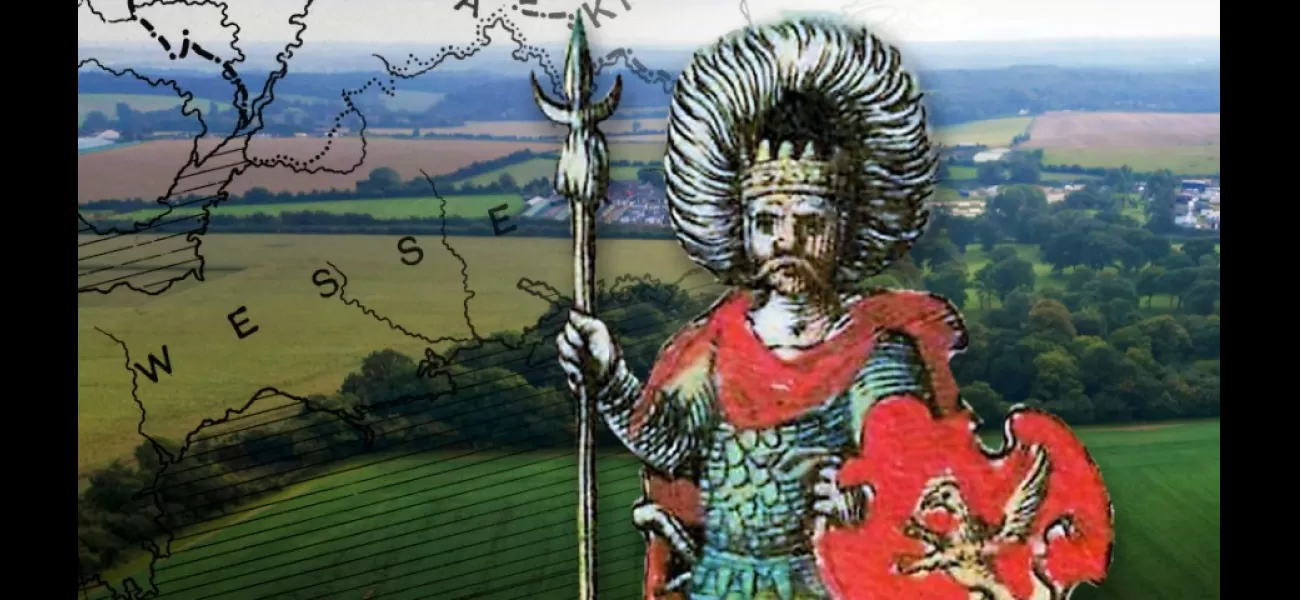Is this where the body of England's initial monarch may have been found?
Harper may have discovered the burial site of a powerful ruler from early England.
April 27th 2024.

For centuries, the identity and final resting place of King Cerdic, the first King of England, have remained a mystery. However, new research from author Paul Harper suggests that the burial site of this legendary King may have been hiding in plain sight in a small Hampshire town.
According to Harper, finding King Cerdic's potential burial site was no easy task. The dark ages, which followed the departure of the Romans from Britain, left behind very few records to guide researchers. But Harper's interest was piqued when he stumbled upon an old reference to the site, with no further details. It wasn't until he came across a charter from King Edward the Elder, dated to 900 AD, that he found a mention of "Ceardices Beorg" - translated to "Cerdic's Barrow" in Old English.
Digging deeper, Harper connected the dots with the help of previous research from academic George Grundy. He discovered that the proposed burial site, known as a barrow, was located on land documented in Hampshire County Council Historic Environment Records. These barrows, also known as cairns or tumuli, were traditional burial sites for powerful individuals during the dark ages.
An aerial photo from the 1970s revealed a plowed-down Bronze Age bowl barrow, measuring 72ft in diameter and 12ft in height, surrounded by a green ditch - similar to other barrows from the same time period as King Cerdic. This was a common practice among the Anglo-Saxons, who often reused Bronze Age burial sites for their own dead.
Harper's discovery not only sheds light on the mysterious King Cerdic, but also gives a glimpse into the early history of England. Descendants of Cerdic are said to have ruled England for generations, making him a significant figure in British history.
Despite little information being available about King Cerdic, he is widely recognized as a strong leader of the early Anglo-Saxon kingdoms in Britain. Illustrations from the 15th century depict him as a fierce warrior, and his legacy is marked with tales of bloody battles and conquests.
Harper notes that it is ironic that the name "Cerdic" is of Brittonic origin, as he spent much of his life battling the Britons. In 519, he famously defeated the Britons at the Battle of Certicesford, near modern-day Charford, and claimed the throne. He later conquered the Isle of Wight, but gave it to his kinsmen.
If the proposed burial site is indeed that of King Cerdic, Harper's research could finally uncover the resting place of one of early England's most formidable leaders. His upcoming book, "Cerdic: Mysterious Dark Age King who Founded England," delves deeper into his findings and is set to be released on April 30th.
According to Harper, finding King Cerdic's potential burial site was no easy task. The dark ages, which followed the departure of the Romans from Britain, left behind very few records to guide researchers. But Harper's interest was piqued when he stumbled upon an old reference to the site, with no further details. It wasn't until he came across a charter from King Edward the Elder, dated to 900 AD, that he found a mention of "Ceardices Beorg" - translated to "Cerdic's Barrow" in Old English.
Digging deeper, Harper connected the dots with the help of previous research from academic George Grundy. He discovered that the proposed burial site, known as a barrow, was located on land documented in Hampshire County Council Historic Environment Records. These barrows, also known as cairns or tumuli, were traditional burial sites for powerful individuals during the dark ages.
An aerial photo from the 1970s revealed a plowed-down Bronze Age bowl barrow, measuring 72ft in diameter and 12ft in height, surrounded by a green ditch - similar to other barrows from the same time period as King Cerdic. This was a common practice among the Anglo-Saxons, who often reused Bronze Age burial sites for their own dead.
Harper's discovery not only sheds light on the mysterious King Cerdic, but also gives a glimpse into the early history of England. Descendants of Cerdic are said to have ruled England for generations, making him a significant figure in British history.
Despite little information being available about King Cerdic, he is widely recognized as a strong leader of the early Anglo-Saxon kingdoms in Britain. Illustrations from the 15th century depict him as a fierce warrior, and his legacy is marked with tales of bloody battles and conquests.
Harper notes that it is ironic that the name "Cerdic" is of Brittonic origin, as he spent much of his life battling the Britons. In 519, he famously defeated the Britons at the Battle of Certicesford, near modern-day Charford, and claimed the throne. He later conquered the Isle of Wight, but gave it to his kinsmen.
If the proposed burial site is indeed that of King Cerdic, Harper's research could finally uncover the resting place of one of early England's most formidable leaders. His upcoming book, "Cerdic: Mysterious Dark Age King who Founded England," delves deeper into his findings and is set to be released on April 30th.
[This article has been trending online recently and has been generated with AI. Your feed is customized.]
[Generative AI is experimental.]
0
0
Submit Comment





